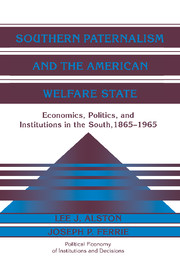 Southern Paternalism and the American Welfare State
Southern Paternalism and the American Welfare State Book contents
- Frontmatter
- Contents
- Preface
- Introduction
- 1 The Economics of Paternalism
- 2 The Politics of Maintaining Paternalism
- 3 Southern Opposition to the Social Security Act
- 4 Southern Opposition to the Farm Security Administration
- 5 The Bracero Program and Wartime Farm Labor Legislation
- 6 Mechanization and the Disappearance of Paternalism
- Conclusion
- References
- Index
- Titles in the series
5 - The Bracero Program and Wartime Farm Labor Legislation
Published online by Cambridge University Press: 05 May 2010
- Frontmatter
- Contents
- Preface
- Introduction
- 1 The Economics of Paternalism
- 2 The Politics of Maintaining Paternalism
- 3 Southern Opposition to the Social Security Act
- 4 Southern Opposition to the Farm Security Administration
- 5 The Bracero Program and Wartime Farm Labor Legislation
- 6 Mechanization and the Disappearance of Paternalism
- Conclusion
- References
- Index
- Titles in the series
Summary
Introduction
The South's system of paternalism and social control was threatened, as we have seen, by federal programs like Social Security and the initiatives of the Farm Security Administration that involved direct government intervention in the relationship between landlords and their tenants and workers. But the system was vulnerable in another respect: If workers perceived that they had better prospects elsewhere, the option of migration out of the South would have made workers less willing to accept paternalistic arrangements. The increased demand for labor during the Second World War created just such an option. Much of the labor legislation enacted during the war, particularly the Bracero Program for the importation of Mexican laborers, reflects the influence of Southerners eager to prevent migration out of the South and maintain the viability of paternalism and social control.
The Second World War was a time of unprecedented dislocation in all sectors of the U.S. economy. The federal government transformed whole industries overnight, mobilized civilian armies of workers to man them, and imposed a system of price controls and rationing that prevented the price mechanism from allocating many resources. One result of such wrenching change was that sectors of the economy that stood to lose under such a regime resorted to nonmarket means to protect their interests. The South was no exception and, as we discussed in Chapter 2, also had the political clout to limit intervention in its labor markets.
- Type
- Chapter
- Information
- Southern Paternalism and the American Welfare StateEconomics, Politics, and Institutions in the South, 1865–1965, pp. 99 - 118Publisher: Cambridge University PressPrint publication year: 1999


